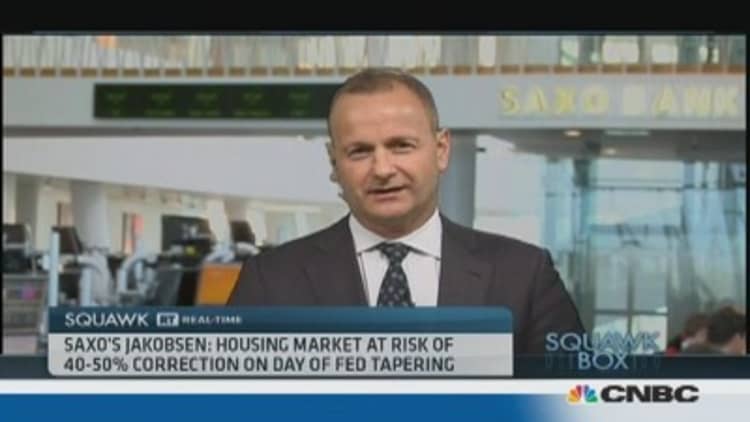
Asia-Pacific's booming property markets are reliant on ultra-loose U.S. monetary policy — and prices could plummet by up to 50 percent when the Federal Reserve starts tapering off its asset purchases, a senior economist warned CNBC.
(CNBC Explains: Tapering)
"The Asian housing market has become increasingly dependent on U.S. funding. So if there is one property market in the world where you find dependence on what happens next in the Federal Reserve it is a market like Hong Kong," said Steen Jakobsen, the chief economist and chief investment officer at Saxo Bank, who had just completed a week-long trip to Singapore, Indonesia and Hong Kong.
Speculation has continued for months as to when the Fed might start scaling back its massive $85 billion-a-month bond-buying program, designed to aid the country's recovery since the subprime mortgage and global financial crises. European and Asian markets, as well as Wall Street, have tended to turn lower on any hints of pending tapering, such as when New York Fed President William Dudley expressed optimistic about the U.S. recovery on Monday.
But despite the global downturn, countries such as Hong Kong and Singapore have seen sky-high property price rises, with Singaporean property prices souring around 60 percent in the past three years. This is despite multiple efforts by Singapore's government to cool the market, including limiting mortgage sizes to a 60 percent debt-servicing ratio of borrowers' monthly income.
China also unveiled measures to stabilize its property market on Friday, on the same day that government data showed prices for new homes in the country rose at a record pace in October. Prices rose 9.6 percent from a year earlier, according to Reuters calculations based on data from China's National Bureau of Statistics, compared to 9.1 percent in the previous month.
(Read more: China's new home prices rise at record pace)
Jakobsen likened the Asian housing bubble to that experienced by the U.S. prior to the sub-prime crisis, and said that a similar collapse loomed for Asia when the Fed started tapering — which he forecast would be "very soon".
"The reason why money flows into real estate is that people are increasingly speculating that it will go ever higher, not dissimilar to what we saw in the early part of the crisis in the U.S., and then all through the 2000s. I think we are repeating the same mistakes," he said.
—By Katy Barnato


